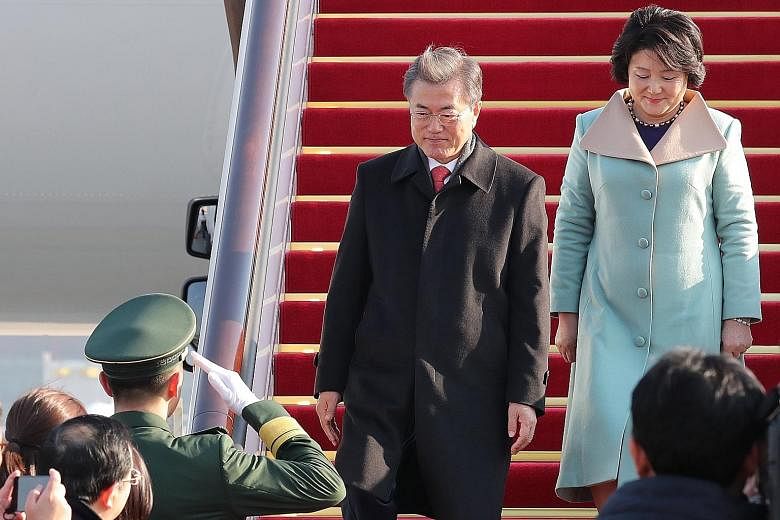Visiting South Korean President Moon Jae In has said his country and China should broaden their economic partnership in eight areas, including e-commerce, new technologies, and start-ups, as he sought to mend frayed ties between the two nations.
Speaking to South Korean and Chinese business executives at the Diaoyutai State Guesthouse yesterday, Mr Moon stressed the need to expand bilateral trade and investment beyond traditional manufacturing-based industries, to include services and new industries such as the Internet of Things, artificial intelligence, robotics and unmanned aerial vehicles.
He also pushed for negotiations to expand the China-Korea free trade deal inked in 2015, so as to maximise benefits for both countries. "If the past 25 years allowed us to build a path for friendship and cooperation, the next 25 years is time for us to sail towards co-prosperity. Our two countries share the same destiny and will prosper together," he said.
Mr Moon is on a four-day visit at the invitation of Chinese President Xi Jinping. The Korean leader is accompanied by the largest-ever business delegation of more than 260 people.
Mr Moon's visit is meant to mend frayed ties, particularly in economic exchanges, which have stalled in the past 11/2 years because of China's displeasure over South Korea's deployment of an advanced missile defence system.
The US' Terminal High Altitude Area Defence (Thaad) anti-missile system was agreed on by South Korea and the US in July last year as a defence against the North Korean nuclear threat.
However, the Chinese are vehemently opposed to the deployment of Thaad, which began in May this year, viewing it as a threat to China's security as it can track the Chinese military's movements.
Beijing took economic measures to pressure Seoul to stop the deployment, banning group tours of its citizens to South Korea and cracking down on South Korean firms operating in China.
In the first sign of a thaw in ties, the two sides put out similar statements on Oct 31 saying they had agreed to put the dispute behind them and to improve relations.
This was made possible through Seoul's reported agreement to conditions known as the "three Nos" - no deployment of additional Thaad batteries, no joining of a US-led missile defence network and no trilateral security alliance with the US and Japan.
Last month, the Chinese partially resumed group tours to South Korea. Mr Moon, in an interview with China Central Television in Seoul on Monday, said he hoped the two countries "can get over the injuries caused by the Thaad issue and jointly step into a new era".
He is likely to find it hard going.
Chinese commentators said the "three Nos" were only an interim solution to the issue, while South Koreans criticised their government for conceding to the Chinese.
Seoul should know that Beijing's stance on the withdrawal of Thaad will not change, Chinese analyst Lu Chao told the Global Times.
He warned that bilateral ties would not change fundamentally until the Thaad issue was resolved, even though Mr Moon's visit would enhance mutual trust.
Chinese Foreign Ministry spokesman Lu Kang said at a daily briefing on Tuesday that he hoped the Thaad issue could be dealt with "properly", adding that the two countries could get ties back to normal by "respecting each other's core interests".
Mr Moon will meet Mr Xi today. It will be the two leaders' third meeting since Mr Moon came to power in May.
A significant part of his visit will be a trip to the western city of Chongqing, the base of Korea's provisional government during World War II when the country was occupied by the Japanese.
Chinese analyst Zhao Minghao, writing in the Global Times, said this indicated that South Korea would make no concessions to Japan on historical issues.
•Additional reporting by Chang May Choon in Seoul

